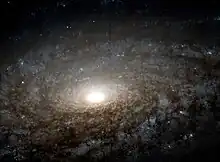| NGC 3521 | |
|---|---|
 NGC 3521 HST | |
| Observation data (J2000 epoch) | |
| Constellation | Leo |
| Right ascension | 11h 05m 48.593s[1] |
| Declination | –00° 02′ 09.24″[1] |
| Redshift | 0.002672[2] |
| Heliocentric radial velocity | 801[3] km/s |
| Distance | 26.2 Mly (8.03[4] Mpc) |
| Apparent magnitude (V) | 11.0[2] |
| Characteristics | |
| Type | SAB(rs)bc[3] |
| Apparent size (V) | 11′.0 × 5′.1[2] |
| Notable features | HII LINER |
| Other designations | |
| UGC 6150, Bubble Galaxy, PGC 33550 | |
NGC 3521 is a flocculent[4] intermediate spiral galaxy located around 26[4] million light-years away from Earth in the constellation Leo. It has a morphological classification of SAB(rs)bc,[3] which indicates that it is a spiral galaxy with a trace of a bar structure (SAB), a weak inner ring (rs), and moderate to loosely wound arm structure (bc).[5] The bar structure is difficult to discern, both because it has a low ellipticity and the galaxy is at a high inclination[3] of 72.7° to the line of sight.[4] The relatively bright bulge is nearly 3/4 the size of the bar, which may indicate the former is quite massive.[3] The nucleus of this galaxy is classified as an HII LINER,[6] as there is an H II region at the core and the nucleus forms a low-ionization nuclear emission-line region.
References
- 1 2 Skrutskie, Michael F.; Cutri, Roc M.; Stiening, Rae; Weinberg, Martin D.; Schneider, Stephen E.; Carpenter, John M.; Beichman, Charles A.; Capps, Richard W.; Chester, Thomas; Elias, Jonathan H.; Huchra, John P.; Liebert, James W.; Lonsdale, Carol J.; Monet, David G.; Price, Stephan; Seitzer, Patrick; Jarrett, Thomas H.; Kirkpatrick, J. Davy; Gizis, John E.; Howard, Elizabeth V.; Evans, Tracey E.; Fowler, John W.; Fullmer, Linda; Hurt, Robert L.; Light, Robert M.; Kopan, Eugene L.; Marsh, Kenneth A.; McCallon, Howard L.; Tam, Robert; Van Dyk, Schuyler D.; Wheelock, Sherry L. (1 February 2006). "The Two Micron All Sky Survey (2MASS)". The Astronomical Journal. 131 (2): 1163–1183. Bibcode:2006AJ....131.1163S. doi:10.1086/498708. ISSN 0004-6256. S2CID 18913331.
- 1 2 3 "NASA/IPAC Extragalactic Database". Results for NGC 3521. Retrieved 2006-10-24.
- 1 2 3 4 5 Mao, Rui-Qing; et al. (December 2010), "An Extragalactic 12CO J = 3-2 Survey with the Heinrich Hertz Telescope", The Astrophysical Journal, 724 (2): 1336–1356, arXiv:1009.4906, Bibcode:2010ApJ...724.1336M, doi:10.1088/0004-637X/724/2/1336, S2CID 118390123.
- 1 2 3 4 Liu, Guilin; et al. (July 2011), "The Super-linear Slope of the Spatially Resolved Star Formation Law in NGC 3521 and NGC 5194 (M51a)", The Astrophysical Journal, 735 (1): 63, arXiv:1104.4122, Bibcode:2011ApJ...735...63L, doi:10.1088/0004-637X/735/1/63, S2CID 119199965.
- ↑ Buta, Ronald J.; et al. (2007), The de Vaucouleurs Atlas of Galaxies, Cambridge University Press, pp. 13–17, ISBN 978-0521820486.
- ↑ Das, Mousumi; et al. (December 2003), "Central Mass Concentration and Bar Dissolution in Nearby Spiral Galaxies", The Astrophysical Journal, 582 (1): 190–195, arXiv:astro-ph/0208467, Bibcode:2003ApJ...582..190D, doi:10.1086/344480, S2CID 18713107.
External links
- NGC 3521 on WikiSky: DSS2, SDSS, GALEX, IRAS, Hydrogen α, X-Ray, Astrophoto, Sky Map, Articles and images